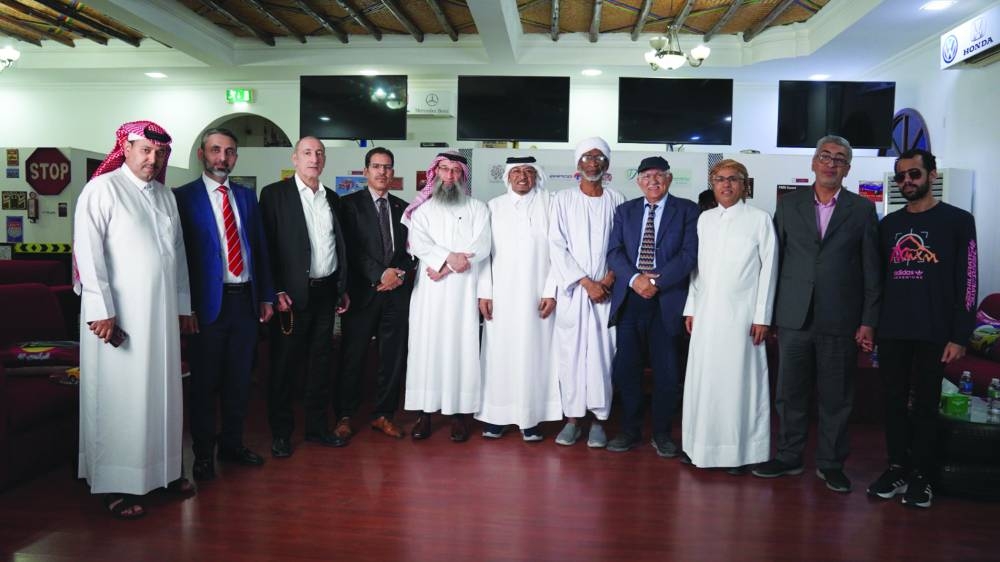The ‘Flower Each Spring’ programme officially concluded the Green Tent activities during the month of Ramadan by holding a symposium that addressed the contributions made by the Qatar Red Crescent Society (QRCS) in the Arab states, along with the charitable societies during the humanitarian crises.
The symposium highlighted the accomplishments made by those charitable societies whose history abounds with giving and dedication to helping people in the Gaza Strip. The event conducted a comparative study between the Arab charitable societies and their Western counterparts.
In the closing statement, head of the ‘Flower Each Spring’ programme Dr Saif Ali al-Hajri emphasised that humanitarian and relief organisations play incredible roles in conflict, war and disaster-stricken regions, and it is imperative to understand the functions of those organisations.
He said that QRCS undertakes the responsibility of monitoring the enforcement of the international humanitarian law, receiving complaints relevant to violations, and contributing to upgrading and disseminating the humanitarian law, in addition to protecting the victims of war and providing relief in times of disasters through the determined functions granted by the Geneva convention and the International Red Cross and Red Crescent Movement.
There are a myriad of challenges that face charitable organisations when performing humanitarian duties, al-Hajri underlined, stating that the participants in the Green Tent underscored the importance of addressing an array of challenges that face the operation of charitable organisations, such as the perilous consequences of operation in conflict, war and disaster-hit zones, along with the challenges of limited funding facing humanitarian and relief organisations.
The participants stressed the importance of overcoming the regulatory and co-ordinative impediments, such as administrative challenges, such as bureaucratic procedures, and funding mechanisms that hamper the effective work of charitable organisations, propagating awareness of the importance of the humanitarian sectors and their roles, in addition to addressing the diverging political visions and emphasising that interests do not prevail over the humanitarian side.
They pointed out that it is critically essential to address the challenges based on sustainable projects and increase the financial support through a whole-of-government approach with the participation of civil society and the private sector, streamlining the regulations, fostering community engagement, and optimising the operational efficiency and co-ordinating at the local, regional and global levels.
Notwithstanding the invaluable initiatives made by QRCS in the Arab states and the operation of charitable organisations in helping the Gaza residents, the hurdles and intransigence put by the Israeli entity in a clear breach of international law and humanitarian law prevented the relief from reaching the indomitable Palestinians in the Gaza Strip, primarily due to the constant airstrikes and restrictions imposed on the access of humanitarian assistance, forced displacement and shortage of fuel and relief equipment, as well as devastation of critical infrastructure and killing of relief personnel, the participants highlighted.
Dean of the College of Sharia and Law at Omdurman Islamic University Dr Ibrahim Ahmed al-Sadiq identified international humanitarian law as a combination of international laws composed of conventional treaties and rules primarily intended to alleviate the war-induced tribulation in times of armed conflict through protecting non-combatant people. For his part, Dr Zaid Abdel Wahab Jaradat, a doctor from Jordan, focused on his personal experiences in helping the medical personnel in Gaza where he volunteered during the war currently raging in Gaza to provide support and to back the medical practitioners in hospitals. He added that Gaza is plagued with many challenges and convoluted situations, emphasising that medical personnel are suffering there after they have come from Arab states as volunteers.
QRCS representative Dr Mahjouba Daoudi talked about the internal efforts of QRCS which are based on the fact that it is part of the Qatari community and primarily aims to promote and advance goodness, in addition to meeting the equal needs of citizens and residents by massive expertise and resources it possesses, in addition to forging co-operation with the public and private institutions in pursuit of achieving the goals of the Qatar National Vision 2030. Daoudi highlighted the relief efforts of QRCS in multiple countries of the world, including its response to humanitarian crises and disasters that broke out during 2023, with the QRCS Disaster Information Management Centre being activated 14 times throughout the year, primarily the disasters and crises such as the earthquake in Syria and Turkiye, the conflict in Sudan, Hurricane Daniel in Libya, the earthquake in Morocco and the Israeli aggression on Gaza.
Additionally, QRCS has launched numerous medical convoys to treat patients in a wide diversity of medical specialisations in collaboration with a host of physicians and technicians from Hamad Medical Corporation and Sidra Medicine.
Mohamed Eddour from Qatar Charity (QC) highlighted the QC relief efforts, adding that QC was established in 1992 and has evolved over the past decades. He indicated that QC currently operates in 70 countries worldwide and has 33 field offices in Africa, Asia, and some European countries.
Relief operators in the Gaza Strip encounter massive challenges concerning access to some areas, the availability of relief items, and their costs, Eddour said, adding that those operators sometimes are pressed to purchase the items with double prices, given the pressing need for them.
Co-ordinator of Green Tent activities Mohamed Hashim al-Sharif said the 18th edition of the Green Tent was full of a wide diversity of topics which helped host dozens of experts and scientists to lay out relevant issues. He added that the Tent had been keen to capitalise on ideas laid out by the participants, along with their solutions and conclusions.

